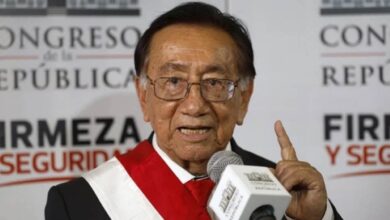Left and right-wing face in Uruguayan elections
After the first round presidential elections on October 27, in Uruguay, there is still the possibility that Frente Amplio, the left-wing coalition that has been in power for 15 years, will not continue the next period.

Daniel Martínez and Luis Lacalle Pou. / Photo: larepublica.ec
LatinAmerican Post | Juliana Suárez
Listen to this article
Leer en español: Izquierda y derecha se enfrentan en Uruguay
Daniel Martínez is the new representative image of the Frente Amplio, the coalition of former President Pepe Mujica, in these elections and before knowing the results of the first-round elections, he faced Luis Lacalle Pou, Ernesto Talvi and Guido Manini Ríos, who, despite being from different political parties, all had a common flag: opposition to Martinez's coalition.
The results left Daniel Martínez with 39.2 percent of the votes and Luis Lacalle Pou of the National Party, with 28.6 percent, which means the need for a second round between these two contenders.
Although the results represent an advantage of more than 10% in favor of Frente Amplio and the Uruguayan left, the truth is that anything could happen in the second round, on November 24, as the candidates who were left out, Talvi (of Partido Colorado) and Manini Ríos (of Cabildo Abierto) have decided to support the opponent and have called on the Uruguayan people to support him so that Frente Amplio loses his power after 15 years.
Also read: Peronism returns to power in Argentina
Although Frente Amplio has great exponents of Latin American politics such as Pepe Mujica and Tabaré Vázquez, who have also been very helpful for Uruguay to register as one of the countries in America with better quality of life, equality, and democracy, according to BBC, the opposition has referred to the need for a change.
Similarly, Sunday's elections were also legislative stage, where Frente Amplio had the greatest opportunities to lose power. For that same intention of change, the legislatures left to results that have not favored the government coalition. Although the leftist Frente Amplio continued with the largest vote, it lost representation in the partial results of what would make up the Parliament. What is certain so far is that these elections leave a diverse Parliament with at least 7 different parties, which would bring plurality to the next government, regardless of the winner.
According to BBC, this government has stood out for two things mainly that are the ones that attract the most attention: annual growth of 4.3 percent, leaving Uruguay well placed compared to the entire region, and 4.8 percent of fiscal deficit in 2018, which is cause for concern for many.
Sustained economic growth, low poverty rates (as low as in Europe) and the highest income per person in the region are some of the factors that make Uruguay stand out.
However, the political crisis of its neighbors has also caused concern in the Uruguayan people. Uruguay's relations with Argentina and Chile are important, even more taking into account the size of the country and the need to expand to the world under the support of larger nations such as its neighbors. The economic crisis in Argentina and the political crisis in Chile have made the citizens of Uruguay wake up to demand that their next government strengthen relations and that the country continues to grow and stand out in the region.
Read also: Latin America is in crisis
Meanwhile, the new campaign begins in which Frente Amplio has assured that it wants to seek political alliances to strengthen itself in the second round, while Lacalle Pou and the National Party have already started with strong alliances that could change the results and give a turn to Uruguayan politics.





